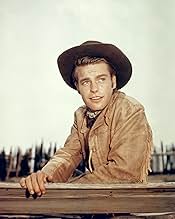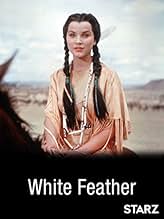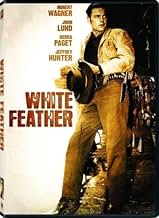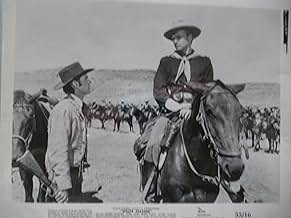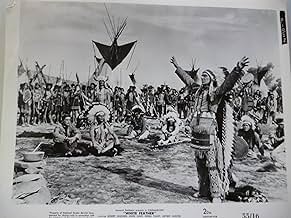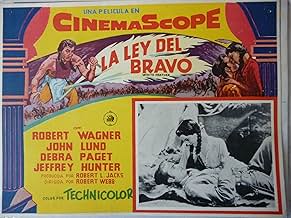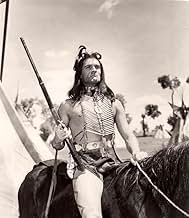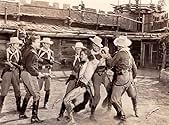CALIFICACIÓN DE IMDb
6.4/10
1.2 k
TU CALIFICACIÓN
Agrega una trama en tu idiomaIn 1877 Wyoming, during the peace negotiations between the Cheyenne and the USA, an Indian girl falls in love with a land surveyor, causing the ire of her Cheyenne fiance.In 1877 Wyoming, during the peace negotiations between the Cheyenne and the USA, an Indian girl falls in love with a land surveyor, causing the ire of her Cheyenne fiance.In 1877 Wyoming, during the peace negotiations between the Cheyenne and the USA, an Indian girl falls in love with a land surveyor, causing the ire of her Cheyenne fiance.
- Dirección
- Guionistas
- Elenco
Noah Beery Jr.
- Lt. Ferguson
- (as Noah Beery)
Iron Eyes Cody
- Indian Chief
- (sin créditos)
- Dirección
- Guionistas
- Todo el elenco y el equipo
- Producción, taquilla y más en IMDbPro
Opiniones destacadas
White Feather is out of Panoramic Productions, it's directed by Robert D. Webb and stars Robert Wagner, Debra Paget, John Lund, Eduard Franz & Jeffrey Hunter. It's adapted from a John Prebble story by Delmer Daves & Leo Townsend. It was filmed in Durango, Mexico, with Lucien Ballard on cinematography duties (CinemaScope/Technicolor) and Hugo Friedhofer provides the score. Plot centres around the peace mission from the US cavalry to the Cheyenne Indians in Wyoming during the 1870s, but problems arose because a few of the Cheyenne refused to leave their hunting grounds.
One of the few 1950s Westerns to show sympathy towards the Indian plight, White Feather is a well intentioned and well executed movie. It suffers a little from familiarity with Broken Arrow (1950), where Delmer Daves had directed James Stewart and Debra Paget thru a similar script to the one that's now in front of Wagner and Paget; and lets face it-Wagner is no Jimmy Stewart- and Robert Webb is no Delmer Daves-but there's more than enough good here to lift it above many other liberal Westerns.
Away from the endearing and emotive story (and it is as the Cheyenne are forced out of Wyoming by the Federals), the film also boasts high points for the Western fan to gorge upon. It's gorgeously shot in CinemaScope by Ballard, a first class lens-man in the genre, and Friedhofer's score is pulsating, evocative and in tune with the tone of the tale. Also of note is that these Native Americans aren't caricatures or pantomime Indians. They may be being played by white actors (Hunter & Franz do especially good work), but they feel real and come out as the human beings they were. In fact the whole movie looks convincing.
There's some missteps along the way; such as Wagner over acting and having a voice that's sounds out of place in the Wild West, while the romantic angle (Paget is so beautiful here who could not fall in love with her?) does at times threaten to clog up the narrative. But these things don't hurt the film. On the flip side there's the smooth pacing of the piece, it's only when the tense and exciting climax has arrived that you realise how well the slow burn first half was handled. And Webb may well be a second unit director in all but name here, but his construction of the scenes with hundreds of extras is top notch work.
A fine and under seen Western that is based on actual events and doesn't over egg its pudding. 7/10
One of the few 1950s Westerns to show sympathy towards the Indian plight, White Feather is a well intentioned and well executed movie. It suffers a little from familiarity with Broken Arrow (1950), where Delmer Daves had directed James Stewart and Debra Paget thru a similar script to the one that's now in front of Wagner and Paget; and lets face it-Wagner is no Jimmy Stewart- and Robert Webb is no Delmer Daves-but there's more than enough good here to lift it above many other liberal Westerns.
Away from the endearing and emotive story (and it is as the Cheyenne are forced out of Wyoming by the Federals), the film also boasts high points for the Western fan to gorge upon. It's gorgeously shot in CinemaScope by Ballard, a first class lens-man in the genre, and Friedhofer's score is pulsating, evocative and in tune with the tone of the tale. Also of note is that these Native Americans aren't caricatures or pantomime Indians. They may be being played by white actors (Hunter & Franz do especially good work), but they feel real and come out as the human beings they were. In fact the whole movie looks convincing.
There's some missteps along the way; such as Wagner over acting and having a voice that's sounds out of place in the Wild West, while the romantic angle (Paget is so beautiful here who could not fall in love with her?) does at times threaten to clog up the narrative. But these things don't hurt the film. On the flip side there's the smooth pacing of the piece, it's only when the tense and exciting climax has arrived that you realise how well the slow burn first half was handled. And Webb may well be a second unit director in all but name here, but his construction of the scenes with hundreds of extras is top notch work.
A fine and under seen Western that is based on actual events and doesn't over egg its pudding. 7/10
As a "Western movie" buff, I am surprised that this film is not more familiar to aficionados of the genre. It is a near epic, classical film.
Of course, it suffers from the usual defect common to Westerns made in this era: The Native American leads are played by white actors and there isn't adequate time to fully develop all of the characters.
Still, it is a magnificent film. It has elements of Shane, which was made several years before, and of The Searchers, which was made a year after.
The sweep and the grandeur are very reminiscent of John Ford films. No expense was spared in cinematography, locations, and the number of extras that were employed. Hundreds of Native Americans were employed, including women and children of all ages. The number of mounted cavalry approximate the size of a cavalry regiment. There weren't that many mounted soldiers in John Ford's cavalry trilogy. And, it was all achieved without the aid of computer graphics.
The dialog is realistic and the story, itself, is based on a true incident. A young Robert Wagner is very believable and likable in his solid, understated role.
This film is enormously enjoyable. I remember seeing it in the 1950s at a drive-in theater, and if only I could do so again!
Of course, it suffers from the usual defect common to Westerns made in this era: The Native American leads are played by white actors and there isn't adequate time to fully develop all of the characters.
Still, it is a magnificent film. It has elements of Shane, which was made several years before, and of The Searchers, which was made a year after.
The sweep and the grandeur are very reminiscent of John Ford films. No expense was spared in cinematography, locations, and the number of extras that were employed. Hundreds of Native Americans were employed, including women and children of all ages. The number of mounted cavalry approximate the size of a cavalry regiment. There weren't that many mounted soldiers in John Ford's cavalry trilogy. And, it was all achieved without the aid of computer graphics.
The dialog is realistic and the story, itself, is based on a true incident. A young Robert Wagner is very believable and likable in his solid, understated role.
This film is enormously enjoyable. I remember seeing it in the 1950s at a drive-in theater, and if only I could do so again!
This is one of a number of 1950s Westerns which attempted to redress the balance by painting a fairly sympathetic view of the American Indian; even so, to spice up proceedings, we get a couple of rebels (second lead Jeffrey Hunter among them) opposing the impending peace treaty offered by the white man. Incidentally, though inspired by a factual incident, the film's plot line basically mingles elements from two contemporary examples of the genre BROKEN ARROW (1950; whose director, Delmer Daves, contributed to the script of this one) and ARROWHEAD (1953). With this in mind, the film doesn't really bring anything new to the table but, made with consummate Hollywood professionalism, the result is undeniably entertaining nonetheless.
Casting is adequate, too: apart from the afore-mentioned Hunter (though not exactly convincing as a redskin), we get Robert Wagner as an all-too-young Government agent hero who mediates between the two parties, Debra Paget (in a virtual reprise of her BROKEN ARROW role and who eventually defies her people by eloping with Wagner), John Lund as the experienced Cavalry officer in charge, Eduard Franz as Hunter's dignified chieftain father, Hugh O'Brian (as with Peter Graves in the same director's BENEATH THE 12-MILE REEF [1953], a viewing of which preceded this one, he's the heroine's brash but unloved intended), Virginia Leith as a more mature secondary love interest for Wagner, and Emile Meyer as her racist storekeeper father. By the way, I've just taped the first cinematic adaptation of Ira Levin's thrller A KISS BEFORE DYING (1956) off Cable TV which I noticed shares a remarkable number of cast and crew members with the title under review (not least its hunky stars)!
Being a largely outdoor film and in order to supply the appropriate grandeur, Lucien Ballard's widescreen photography is rather frustratingly limited to long or medium shots which, when screened on a normal-sized TV set, unfortunately leads to a certain detachment on the viewer's part; by the way, in the accompanying poster gallery on the DVD, the fact that patrons would be watching a "Cinemascope" production was deemed a bigger draw than even the stars involved! The film culminates with an unusual sort of showdown as Hunter and O'Brian face an entire cavalry unit (apparently an Indian battle custom which explains the film's title) however, the duo's come-uppance sees the personal intervention of Franz, who's not pleased with their 'brave' gesture; this is then followed by a lengthy (and, I'd even say, unwarranted) scene in which Wagner meticulously prepares Hunter for burial.
The Fox DVD includes quite a nice assortment of extras: these include a reproduction of the original pressbook (filled with amusingly irrelevant ballyhoo), a reasonably comprehensive photo gallery, and a number of trailers for the studio's other catalog entries in the genre (among them the desirable Victor Mature vehicle FURY AT FURNACE CREEK [1948] surprisingly narrated and carrying the personal endorsement of none other than Gregory Peck! and latterday black-and-white potboiler CONVICT STAGE [1965], which I'd never heard of myself and can't fathom why it was even deemed worthy of a DVD release).
Casting is adequate, too: apart from the afore-mentioned Hunter (though not exactly convincing as a redskin), we get Robert Wagner as an all-too-young Government agent hero who mediates between the two parties, Debra Paget (in a virtual reprise of her BROKEN ARROW role and who eventually defies her people by eloping with Wagner), John Lund as the experienced Cavalry officer in charge, Eduard Franz as Hunter's dignified chieftain father, Hugh O'Brian (as with Peter Graves in the same director's BENEATH THE 12-MILE REEF [1953], a viewing of which preceded this one, he's the heroine's brash but unloved intended), Virginia Leith as a more mature secondary love interest for Wagner, and Emile Meyer as her racist storekeeper father. By the way, I've just taped the first cinematic adaptation of Ira Levin's thrller A KISS BEFORE DYING (1956) off Cable TV which I noticed shares a remarkable number of cast and crew members with the title under review (not least its hunky stars)!
Being a largely outdoor film and in order to supply the appropriate grandeur, Lucien Ballard's widescreen photography is rather frustratingly limited to long or medium shots which, when screened on a normal-sized TV set, unfortunately leads to a certain detachment on the viewer's part; by the way, in the accompanying poster gallery on the DVD, the fact that patrons would be watching a "Cinemascope" production was deemed a bigger draw than even the stars involved! The film culminates with an unusual sort of showdown as Hunter and O'Brian face an entire cavalry unit (apparently an Indian battle custom which explains the film's title) however, the duo's come-uppance sees the personal intervention of Franz, who's not pleased with their 'brave' gesture; this is then followed by a lengthy (and, I'd even say, unwarranted) scene in which Wagner meticulously prepares Hunter for burial.
The Fox DVD includes quite a nice assortment of extras: these include a reproduction of the original pressbook (filled with amusingly irrelevant ballyhoo), a reasonably comprehensive photo gallery, and a number of trailers for the studio's other catalog entries in the genre (among them the desirable Victor Mature vehicle FURY AT FURNACE CREEK [1948] surprisingly narrated and carrying the personal endorsement of none other than Gregory Peck! and latterday black-and-white potboiler CONVICT STAGE [1965], which I'd never heard of myself and can't fathom why it was even deemed worthy of a DVD release).
Robert Wagner( Josh Tanner) was climbing up the ladder of success in this movie and gave an excellent performance along with Debra Paget(Appearing Day) and even Noah Berry, Jr.(Lt. Ferguson)(son of the famous Wallace Berry of the 1930's and 40's) The photography was fantastic and the plot was not just one of those typical Western films. In many ways, this picture made you feel very sorry for the Native Americas of this country who lost their wonderful land and Buffalo and had to locate South in very barren lands. Try to catch this movie on TV and you will definitely enjoy the youthful face of Robert Wagner along with great actors and a wonderfully made film of 1955!
This is a precedent setting Western which suffers from an average script, poor casting and botched editing. There are many similarities between this film and "Broken Arrow". These similarities begin with the sympathetic portrayal of Native Americans. Debra Paget is also on hand to once more play her role as an Indian woman in love with a White man. The main problem here is that Robert Wagner is not Jimmy Stewart. Delmer Daves had a role in both films, but unfortunately he was limited in "White Feather" to co-writing the script. Robert Webb directed this film.
This film seems to be the victim of poor editing. The Ann character played by Virginia Leith is potentially one of the most interesting in the film. There is more than a hint at the beginning that she has a dark secret. "Did my father tell you about me", she asks Josh Tanner (Wagner). Her father (played by Emile Meyer) later elaborates that "she is unfit merchandise". Unfortunately, this aspect of the plot is not developed. Jeffrey Hunter steals the show with his sympathetic and sensitive portrayal of Little Dog, a Cheyenne leader. He and Tanner become friends, and their friendship is one of the memorable elements in this film. Little Dog is proud to be a Cheyenne. He is torn between loyalty to his father, Chief Broken Hand (played by Eduard Franz), and his warrior code. In the end it becomes a choice between giving up his heritage to walk the White Man's road and dying well. The choice isn't as obvious as it seems. Little Dog's friend American Horse (played by Hugh O'Brian) has the opportunity to make the same choice and blows it.
This film's portrayal of the Native American tragedy is both sympathetic and different. Tanner tells the Colonel (played by John Lund) at the beginning that he has no feeling about Indians. He is indifferent. Ann makes her sympathies clear at the start. "I feel sorry for them," she says and she and Tanner watch the tribes as they prepare to sign a treaty giving up their lands. Ultimately, Tanner's friendship with Little Dog gives him a new perspective. Unlike "Devil's Doorway", another film which works hard to present the Native American view of the winning of the West, this film's ending is more upbeat. I still haven't been able to force myself to watch all of "Devil's Doorway".
Although marriages between Whites and Indians were not unusual in the real West, they had a difficult time surviving in the morality of films of the 40's and 50's. This film is one of the first in which a White character marries an Indian girl. Most Westerns of the time did not permit such relationships to become permanent. Paget's character in "Broken Arrow" is tragically killed. Similar violent endings terminate relationships in "Drum Beat", "Rock Island Line" and "Across the Wide Missouri". In "The Far Horizons" the Native American character ends the relationship by returning to her people so that one of the lead characters can marry a White woman. Dewey Martin's character in "The Big Sky" marries an Indian woman, but he has to make a choice. Will he return to the settlements where there is no place for her or will he live with the Blackfeet? Ultimately, he chooses Indian life. If the film's script had included part two of Guthrie's novel, we would see that this relationship was ultimately the victim of tragedy as well. Tanner's decision in this film to marry the Indian woman and live in the White world is truly unusual for films of the time.
It is the friendship between Tanner and Little Dog which makes the film worth watching. Wagner plays his relationship with Hunter's Little Dog with a lot more feeling and credibility than he does his romantic interest in Paget's character. Hunter's performance is a gem. Unlike Native American roles in so many other Westerns Hunter doesn't offer us the inane dialogue and dopey hand movements which we see too often in such roles. Although Tanner and Little Dog come from different worlds, their shared humanity is refreshingly realistic. It is ironic that their friendship becomes the catalyst for peace. Little Dog as a warrior is opposed to peace. "The treaty pen does not fit my hand", he jokes to Tanner.
Despite its flaws, this film is worth watching for its creative story and its sympathetic and credible portrayal of the Native American experience. The emphasis on story over action is unusual for such a Western and with a little better script it would have worked. Even so, it works well enough for me. I have watched it many times and will continue to do so.
This film seems to be the victim of poor editing. The Ann character played by Virginia Leith is potentially one of the most interesting in the film. There is more than a hint at the beginning that she has a dark secret. "Did my father tell you about me", she asks Josh Tanner (Wagner). Her father (played by Emile Meyer) later elaborates that "she is unfit merchandise". Unfortunately, this aspect of the plot is not developed. Jeffrey Hunter steals the show with his sympathetic and sensitive portrayal of Little Dog, a Cheyenne leader. He and Tanner become friends, and their friendship is one of the memorable elements in this film. Little Dog is proud to be a Cheyenne. He is torn between loyalty to his father, Chief Broken Hand (played by Eduard Franz), and his warrior code. In the end it becomes a choice between giving up his heritage to walk the White Man's road and dying well. The choice isn't as obvious as it seems. Little Dog's friend American Horse (played by Hugh O'Brian) has the opportunity to make the same choice and blows it.
This film's portrayal of the Native American tragedy is both sympathetic and different. Tanner tells the Colonel (played by John Lund) at the beginning that he has no feeling about Indians. He is indifferent. Ann makes her sympathies clear at the start. "I feel sorry for them," she says and she and Tanner watch the tribes as they prepare to sign a treaty giving up their lands. Ultimately, Tanner's friendship with Little Dog gives him a new perspective. Unlike "Devil's Doorway", another film which works hard to present the Native American view of the winning of the West, this film's ending is more upbeat. I still haven't been able to force myself to watch all of "Devil's Doorway".
Although marriages between Whites and Indians were not unusual in the real West, they had a difficult time surviving in the morality of films of the 40's and 50's. This film is one of the first in which a White character marries an Indian girl. Most Westerns of the time did not permit such relationships to become permanent. Paget's character in "Broken Arrow" is tragically killed. Similar violent endings terminate relationships in "Drum Beat", "Rock Island Line" and "Across the Wide Missouri". In "The Far Horizons" the Native American character ends the relationship by returning to her people so that one of the lead characters can marry a White woman. Dewey Martin's character in "The Big Sky" marries an Indian woman, but he has to make a choice. Will he return to the settlements where there is no place for her or will he live with the Blackfeet? Ultimately, he chooses Indian life. If the film's script had included part two of Guthrie's novel, we would see that this relationship was ultimately the victim of tragedy as well. Tanner's decision in this film to marry the Indian woman and live in the White world is truly unusual for films of the time.
It is the friendship between Tanner and Little Dog which makes the film worth watching. Wagner plays his relationship with Hunter's Little Dog with a lot more feeling and credibility than he does his romantic interest in Paget's character. Hunter's performance is a gem. Unlike Native American roles in so many other Westerns Hunter doesn't offer us the inane dialogue and dopey hand movements which we see too often in such roles. Although Tanner and Little Dog come from different worlds, their shared humanity is refreshingly realistic. It is ironic that their friendship becomes the catalyst for peace. Little Dog as a warrior is opposed to peace. "The treaty pen does not fit my hand", he jokes to Tanner.
Despite its flaws, this film is worth watching for its creative story and its sympathetic and credible portrayal of the Native American experience. The emphasis on story over action is unusual for such a Western and with a little better script it would have worked. Even so, it works well enough for me. I have watched it many times and will continue to do so.
¿Sabías que…?
- TriviaFirst American movie filmed (in 1954) in Durango, Mexico, because art director Jack Martin Smith liked the soundstages in the city and found the surrounding landscapes to be just what he was looking for.
- ErroresThe Army, at no time during the Indian Wars, used Winchester repeating lever action rifles, as shown.
- Citas
Josh Tanner: Eveything you will see in this movie actually happened, with the exception being the Indians' language. For the purposes of this story, they will speak English so that you can understand them.
- ConexionesReferenced in Chappaqua (1966)
Selecciones populares
Inicia sesión para calificar y agrega a la lista de videos para obtener recomendaciones personalizadas
- How long is White Feather?Con tecnología de Alexa
Detalles
- Fecha de lanzamiento
- País de origen
- Idioma
- También se conoce como
- White Feather
- Locaciones de filmación
- Fort Laramie National Historic Site - 965 Gray Rocks Road, Fort Laramie, Wyoming, Estados Unidos(actual Fort at center of events and activities portrayed)
- Productora
- Ver más créditos de la compañía en IMDbPro
Taquilla
- Presupuesto
- USD 1,125,000 (estimado)
- Tiempo de ejecución1 hora 42 minutos
- Relación de aspecto
- 2.55 : 1
Contribuir a esta página
Sugiere una edición o agrega el contenido que falta

Principales brechas de datos
By what name was La ley del bravo (1955) officially released in India in English?
Responda
